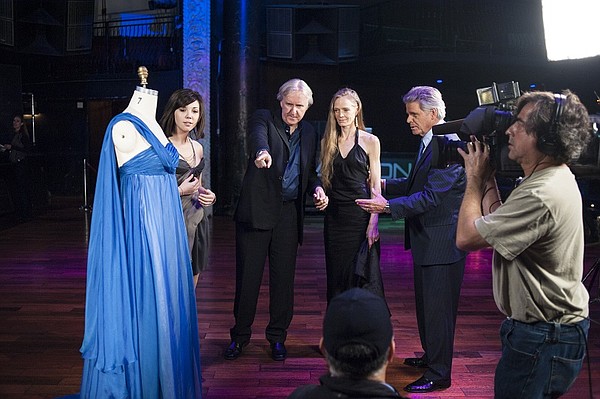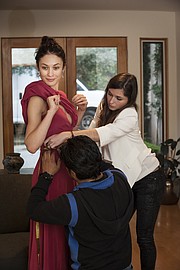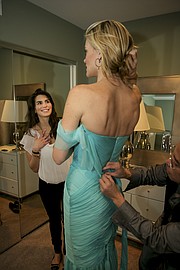Red Carpet Green Dress Design Contest 2010 winner Jillian Granz created a peace-silk dress with a reclaimed lining and no-waste pattern. The gown was worn by Suzy Amis Cameron when she attended the Oscars that year. Photo: RCGD
FASHION
RCGD Returns to Its Roots With Sustainable-Design Competition
While the Suzy Amis Cameron-founded Red Carpet Green Dress has been committed to supporting responsible garment design at the luxury level since its launch in 2009, there has been an important part missing from its mission for the last four years. This week, the eco-fashion organization announced the launch of the Red Carpet Green Dress Design Contest 2020.
“It wasn’t about going to big established houses and asking them to make a sustainable dress,” according to RCGD Chief Executive Officer Samata Pattinson. “[Amis Cameron] wanted to open the door to emerging designers and say ‘If you have talent, you have an opportunity to be on this platform.’"
Working under the themes of sustainable materials and waste reduction, candidates will create designs that adhere to the RCGD mission. With its partner Tencel Luxe, an offering from Austria-headquartered Lenzing, designers will choose from three fabrics in the line—100 percent Tencel Luxe, Tencel Luxe-silk blend that uses GOTS-certified fibers and a Tencel-Luxe cruelty-free cashmere fusion. Designers are also permitted to include embellishments that are sourced responsibly, such as vintage beads.
“The themes for this year’s contest are sustainable materials, which is a big one for us just because of the impact of textiles on the planet,” Pattinson said. “With the sketches they submit, we want them to explain why they chose these textiles, talk about their designs and how they will minimize waste when creating the design, if they are chosen as a winner.”
With social-distancing guidelines in place around the world and stay-at-home mandates enacted by many governments, designers are tasked with choosing their fabrics remotely, yet Pattinson explained how the process is facilitated through digital measures.
“We’ve emoted and animated the textiles, so they can see how the textiles move and hear them,” she said. “We’ve done that digitally allowing them to choose textiles virtually.”
As Harold Weghorst, global vice president for Lenzing Group mentioned, this opportunity is for designers to showcase their talents, but also a moment during which luxury fashion can be created through sustainable methods.
“Whilst some people may have historically equated eco-fashion with boring and not as comfortable for the wearer, we wanted to highlight that eco-friendly fibers can actually offer greater comfort and other advantages over other natural or synthetic products,” he said. “Not only will we help the winner to bring their eco-couture to life and stun at the global stage, we also want to showcase how our durable and high-quality fibers can offer exceptional comfort to the wearer.”
The two winners will be selected for designs in different categories—one in a gown category and another for suiting. A $1,000 award will be given to each designer, in addition to a business-oriented mentorship with Pattinson. Successful entrants will also travel to Los Angeles for the awards-season Red Carpet Green Dress Gala, for which they will dress contest ambassadors where designs will be unveiled. Prior to the gala, designers will work with Amis Cameron to learn more about sustainable fashion, in addition to participating in an internship at the atelier of Laura Basci.
“Sustainability is often sidelined in couture, therefore, when we first joined hands with RCGD in February this year to unveil an Oscars 2020 campaign, we were able to put the spotlight on sustainability on red carpets,” Weghorst explained. “With the debut of a range of eco-couture textiles, we showcased the perfect balance of the world of elegance and power of eco-couture.”
During the 2020 Academy Awards, director Elena Andreicheva accepted her Oscar for the film “Learning to Skateboard in a Warzone (if you’re a girl)” while wearing a Basci sustainable design that had been created through the RCGD initiative with Tencel Luxe.
“The Oscars partnership is so important to us. The Academy has a long-standing place in our hearts,” Pattinson said. “They opened that platform up to us. They give us access every single year to make that statement.”
After its four-year hiatus, the competition returns to support emerging designers, but also those who make clothing, often under less-than-desirable circumstances. Due to the COVID-19 pandemic, many workers in developing countries—who are often women—have stopped working, resulting in lost wages, or must return to work in potentially unsafe conditions. Proceeds from the competition, in addition to previously outlined RCGD charitable commitments will benefit workers who are helped by services available via the Awaj Foundation and The Fifth Pillar—through Fair Wear, which aim to support garment workers.
“We also have to look after our allies. That is very important about this contest,” Pattinson said. “It is championing hope for creators, but it is also championing hope for the makers. The women and children in Myanmar, the women in Bangladesh, some of whom are having to go back to work in factories—we’ll be providing them with masks so at least they’ll have protection if they are forced to go back to work.”
As more of these workers face great challenges due to a shifting manufacturing environment stemming from COVID-19, the organizations that help them are also faced with more clients who are in need of assistance. Nay Win Naing, program director for The Fifth Pillar, explained that the organization launched a new initiative, Doe Lote Thar, to raise funds to aid pregnant workers and those who are plagued by health issues, in order to support them through the coronavirus pandemic.
"We feel that the design contest is not only about the contest but also the event urging for the global empathy—what is needed in the world now more than ever. What we are doing now will explain how best we can build the future of humanity," Nay Win Naing said. "Doe Lote Thar in Myanmar language is 'Our Workers,' and we mean that we are together with them when they need us. We would like to ensure that the project supports what is practical for the workers even if it is small. And this is when Red Carpet Green Dress comes in with a big help."
Contest submissions will be accepted, along with a $30 entry fee, through rcgdglobal.com until July 30 with winners selected by Aug. 28, according to a panel of judges comprising Amis Cameron, Basci, Weghorst and Nazma Akter, who is the founder and executive director of the Awaj Foundation. Launched on May 12, the contest is open to designers from all regions of the world who are over the age of 21. For Pattinson, the opportunity to see how sustainability translates from other regions of the world is an invaluable learning experience that she treasures.
“We’ve learned so much from our students who came from China, or Ghana, and they’ve learned from us. There is this cultural transfer that happens,” she said. “That alone is something that is refreshing.”

























